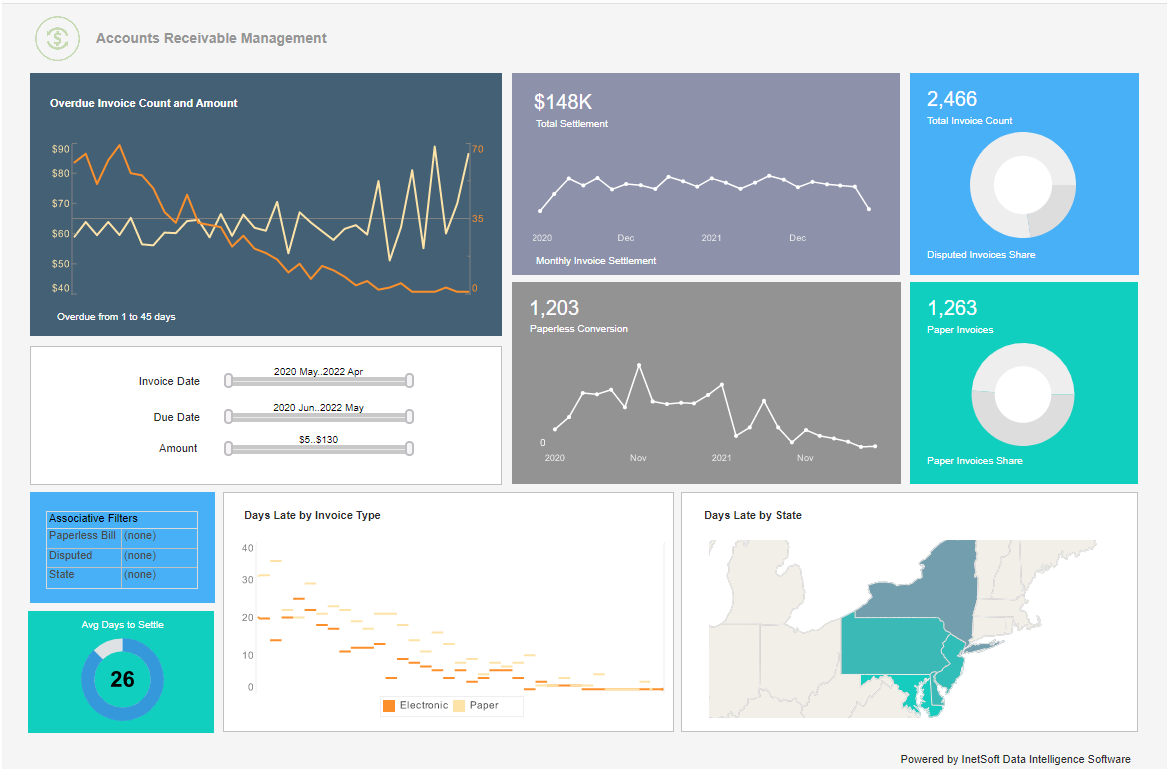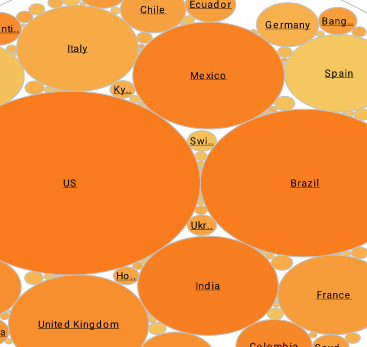Features of Good Financial Analysis Software
Financial analysis is the process of analyzing finances to identify and fix issues. To do this, you need good financial analysis software with the right features. Luckily, the market has several financial analysis software you can invest in for your business.
What Is Financial Analysis Software?
Financial analysis software is a tool that helps you analyze your business data and make decisions based on that data. This software isn't only for people doing accounting or finance work. Even if you're not an accountant, you can use it to understand your business better and make higher-quality decisions.
Financial analysis software can be used as a standalone tool or integrated into an accounting or financial management system. In either case, it has many features that make it useful in helping you perform financial analysis tasks.
| #1 Ranking: Read how InetSoft was rated #1 for user adoption in G2's user survey-based index | Read More |
What Are the Main Features of Financial Analysis Software?
Check out the must-have features of financial analysis software.
-
Have a Simple User Interface
The last thing you want is financial analysis software that is too complicated or confusing to use. A good financial analysis tool should be easy to use. If you can't figure out how to use it, then it's probably not worth using at all. There should be an intuitive interface allowing users to move quickly through different sections of the program without needing any specific knowledge about accounting or finance.
The software should also offer an easy-to-understand navigation system so that users know where they are and what they need to do next. This way, the users won't have to search through menus and submenus every few minutes while trying to get work done!
-
Ability To Create Custom Dashboards
Dashboards are visual representations of data, which makes it easier for users to understand. With good dashboards, users can see information in an organized way and know where they are on the process of analyzing their data.
Dashboards help people focus on key insights and decisions so they can quickly move forward with their work. They also provide insight into trends in the market or industry, which helps clients make better decisions about their business operations.
-
Ability To Integrate With Other Tools
The ability to integrate with other tools is one of the essential features of good financial analysis
software. Integrations are key because they allow you to automatically pull data from other sources and import
it into your spreadsheet or database. For example, you can use integration with QuickBooks to import your
company's invoices and purchase orders without manually entering them.
Another benefit of integrations is that they allow you to view your data in multiple formats. You can export
your data in Excel or spreadsheets, which can be useful for sharing with colleagues or customers.
-
Supports Statistical Data Analysis
Data analysis is the process of extracting data from its source and then making sense of it. Data analysis involves a lot of computation, but it isn't just about crunching numbers. It is also about understanding the numbers, which means that you need to be able to interpret what they mean.
Financial data analysis requires understanding how to interpret the numbers and turn them into meaningful information. This means you need a tool that can support statistical data analysis and make sense of your financial data.
-
Helps Conduct Research and Investigation
The best financial analysis software helps you conduct research and investigation. It is a valuable tool that helps you find out what is happening in the market, what products are selling, how people are using them, and much more.
The software will help you analyze data to come up with conclusions. It will also help you find out how long it will take for a product to sell out or how long it will take for a business to start making money from a particular product or service.
You can use the software to track down information about your competitors so that you can stay ahead of them in the market. Also, use it to track down your customers' needs and wants so that you can develop products that meet their requirements and ensure that they buy them.
-
Creates Comparative Reports
Good financial analysis software can create comparative reports. Comparative reports are particularly helpful when your company is looking at new markets or exploring new products. They can help you see what other companies are doing and how your own business compares.
Comparative reports can be created using different criteria such as sales volume, profit margin, customer satisfaction, etc. The purpose of creating comparative reports is to identify which product or vendor performs better or worse than others.
Good financial analysis software also lets you look at different periods and compare the results for each period. You can also use these reports to compare projects that have been completed against those that have not been completed yet.
 |
View live interactive examples in InetSoft's dashboard and visualization gallery. |
-
Support Cloud Computing
Cloud computing is the delivery of applications, data, and services over the Internet. In other words, it is a way for businesses to access and use different technology resources over the internet. Cloud computing is quickly gaining traction as it offers numerous benefits that can significantly boost productivity and efficiency in various industries.
One advantage is that you can access cloud-based software from any location with an active internet connection. So, you don't have to install any software on your computer or mobile device to start your project. You simply need an account and start working on your project immediately!
-
Offer Real-Time Reporting
Good financial analysis software should offer real-time reporting, allowing users to get a snapshot of their business at any moment. It should also be easy to use for all levels of employees, and it should have an intuitive user interface.
Real-time reporting is especially important if you need to make decisions quickly. For example, if your company is about to launch a new product or service, you might want to know how well it's selling before making any large investments.
Financial analysis software should be able to perform various tasks related to that field. As you choose one for your business, ensure it has the above features, and financial data analysis will be a breeze for your business.
What Is the Difference Between a Product Manager and a Data Product Manager?
The two are often confused, but they are not the same thing. While a product manager is responsible for managing the entire product lifecycle, a data product manager focuses on creating and maintaining data products.
A product manager is responsible for defining and managing the overall vision and mission of the product. On the other hand, a data product manager creates and maintains that vision by managing all aspects of data product development and management.
To put it simply, the major difference between these two jobs is responsibility. A product manager ensures that the customer gets what they want from the company. A data product manager takes on more of an engineering role in understanding how to build something out of existing business processes or industry standards.
How Does a Data Product Manager Benefit the Product Development Cycle?
Data product managers benefit the product development cycle in three ways:
- Data product managers gather and organize data to be used by the team. This includes all the information needed to decide on what to build, including user feedback and market research.
- Data product managers create an environment where everyone can access all the information needed to make decisions about the product and its features. So, everyone clearly understands what needs to be built, why it needs to be built, who will use it, and how it will be used.
- Data product managers help ensure that everyone involved in building a new product is on the same page about goals and expectations for that product.
 |
Learn about the top 10 features of embedded business intelligence. |
Do You Need a Data Product Manager?
The short answer is: yes. But why?
A data product manager is responsible for creating and managing data-derived products. These products can include reports, dashboards, other visualizations, and AI-generated content like chatbots. They also handle development tasks like building prototypes and hiring team members.
If you're thinking about increasing your company's revenue by improving how it integrates with its customers' business processes through new data-driven insights and experiences, then hiring a data product manager might be the key to success.
 |
Read the top 10 reasons for selecting InetSoft as your BI partner. |
FAQs
-
What Is Data Product Management?
Data Product Management is a field that encompasses managing the creation, development, and delivery of data products. Data products are given to clients to use in their business processes.
-
What Makes a Good Data Product Manager?
A good data product manager understands their company's business needs and how their products can best meet them. They understand the value of their products, and they know what is important to the people who use them. They can then translate that information into something that will help people, which is what data product management is all about.
-
What Does DPM Do for My Business?
DPM helps you prioritize your efforts so that you can spend your time on what matters most, which is driving
growth and revenue. DPM also enables you to understand where your data sources go wrong, so you can fix them
before they hurt your bottom line.
Data product management is a new field. It's a field that involves both people and technology, so it requires
a unique blend of skills. But it's also an exciting field because there are numerous growth and innovation
opportunities. Keep in mind that you need a dedicated data product manager to do this successfully.

